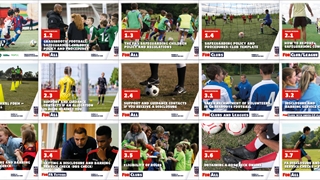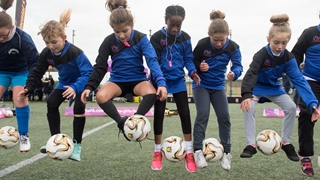
We know football runs on ‘parent power’ – those who take on the many volunteer roles within the game – and our thanks go to every one of you.
The NSPCC is highlighting the important role parents and carers play in sport this week with their campaign Parents in Sport.
Our ‘We Only Do Positive’ campaign showcases how important your positive support is for the enjoyment and development of youth football players in England.
Our aim is for every football parent to know:
- Who their child’s Coach and Club Welfare Officer are and how to contact them
- What the club's values are and how parents can get involved
- What to do if they have a concern
If you don’t know this information then we’d encourage you to speak with your club this week and find out more. All policies should be made readily available and shared with players and parents, whether that’s on your club’s website, a welcome pack or open information sessions for parents at the start of the season.
You have a right and a responsibility to ensure that your children are safe at all times.
If your child is already playing or interested in playing football, here’s our guide to choosing a club:
Look for a club that:
- Has a club welfare officer
- Has a safeguarding children policy
- Welcomes questions about their activities
- Checks that volunteers and staff are suitable to work with children
- Has a written code of conduct for club officials, players and spectators
- Offers support and training to volunteers and staff
- Has a qualified coach(es)
- Has a qualified first aider(s)
- Has an equality policy
- Has a club complaints procedure
Charter Standard clubs have all the above already in place. For more information and to find a Charter Standard club, contact your County FA.
All affiliated clubs must have the following in place: a Safeguarding Children Policy and a Club Welfare Officer (CWO) who has been DBS checked and trained. The Chairperson, Secretary, Treasurer and CWO must have completed The FA's free ‘Safeguarding for Committee Members’ course and all coaches must be named against the team they are involved with on The FAs system, must be DBS checked and trained.
If you want to know more about how a club operates or to get involved with volunteering at a club just ask.
A good club will be happy to let you know how they organise things. Most clubs are looking for new members and especially volunteers.
Find out more about how to safeguard your child, including best practice guidance, how to report a concern, safeguarding policies and procedures, how to use the internet safely and more.










